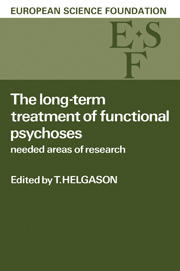Book contents
- Frontmatter
- Contents
- List of Participants
- Introduction
- I Organisational Aspects of Long-term Treatment
- II Patients Aspects of Long-term Treatment
- Needed are as of research in psychological treatments for functional psychoses
- Family therapy as part of the treatment of schizophrenia
- Milieu therapy in the long-term treatment offunctional psychoses: needed areas of research
- Long-term treatment of functional psychosis with neuroleptics
- Lithium and prophylaxis in manic-depressive illness
- New perspectives in psychopharmacology
- Research implications of recent trends in the treatment of schizophrenia
- Long-term treatment of functional psychoses in childhood and adolescence
- Functional psychosis in old age
- Chronicity and hospitalization: can the viciouscirclesbe broken?
- Social network and the long-term course of mental disorders - research needs
- III Public Health Aspectsof Long-term Treatment
- Index
Functional psychosis in old age
from II - Patients Aspects of Long-term Treatment
- Frontmatter
- Contents
- List of Participants
- Introduction
- I Organisational Aspects of Long-term Treatment
- II Patients Aspects of Long-term Treatment
- Needed are as of research in psychological treatments for functional psychoses
- Family therapy as part of the treatment of schizophrenia
- Milieu therapy in the long-term treatment offunctional psychoses: needed areas of research
- Long-term treatment of functional psychosis with neuroleptics
- Lithium and prophylaxis in manic-depressive illness
- New perspectives in psychopharmacology
- Research implications of recent trends in the treatment of schizophrenia
- Long-term treatment of functional psychoses in childhood and adolescence
- Functional psychosis in old age
- Chronicity and hospitalization: can the viciouscirclesbe broken?
- Social network and the long-term course of mental disorders - research needs
- III Public Health Aspectsof Long-term Treatment
- Index
Summary
While it is relatively easy to distinguish between functional and non-functional psychoses in adults, we find that matters become rather complex in old age, beginning let us say at the age of 65. There is almost always an overlapping of different factors, some of them specific to old age and others to the lifetime's experience of the individual. If we undertake to draw up a list of these factors, they would include the following.
The immediate environment
It is important in our pathogenetic hypotheses to note whether an aged person lives alone, in a family or in an institution. Social and affective isolation has been identified as one of the major factors in explaining psychic decompensation in the period of senescence.
The socioeconomic factor
It is a commonplace to assert that a person who has prepared for his retirement, who can carry out activities which interest him beyond the arbitrary limits of age, has a protective space around him against intolerable frustrations and against what Balier, has described in his theory of aging as ‘the emptying of the positive content of narcissism, that is self esteem’.
Cerebral functioning
Physiological involution of the central nervous system appears, sooner or later, in old age. The variations are very great. We know centenarians with virtually intact intellectual capacities whereas, in other persons, reduction in the ability to adapt and learn, an impoverishment of imagination, and also a reduced capacity for storing engrams, are perceptible very early. Much has been said and written about the so-called involutive or psycho-organic element, in various functional psychoses of advanced years. While some authors attribute to this only a very secondary role and dispute the dogma of a ‘defectology’, others (on the basis of systematic investigations) demonstrate that a psycho-organic component may play a considerable role in triggering and maintaining functional psychoses in aged people.
Predispositions/ personality traits
In our own studies, we have found that, despite certain accentuations, the character remains the same up to an advanced age and that even in the deepest demential states we can still recognize typical personality traits that have persisted throughout the life of the individual. These predispositions may therefore influence, if not the origin, at least the form and content of a functional psychosis.
- Type
- Chapter
- Information
- The Long-Term Treatment of Functional PsychosesNeeded Areas of Research, pp. 145 - 150Publisher: Cambridge University PressPrint publication year: 1985

